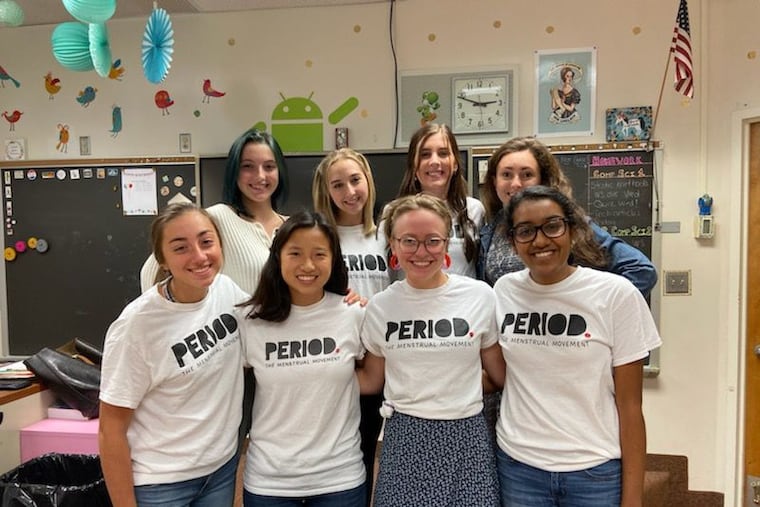Menstruation is having a moment: Here comes National Period Day
The event aims to bring awareness to periods as the movement aligns itself with both #MeToo and the broader, largely youth-driven, post-Trump activism energy and push to equate menstrual equity with gender equity.

After President Donald Trump was elected in 2016, Jennifer Weiss-Wolf was working on a book about periods and constantly worrying that her exploration of menstruation would flop in the face of everything else happening politically.
Then, the #MeToo movement broke open in 2017, a week after her book’s release, and the fear of irrelevance came flooding back.
“But I took a total about-face,” she said, “and I thought, ‘Actually, this is the exact same thing.’ ”
Weiss-Wolf, the vice president of development at the Brennan Center for Justice, is one of the pioneers of the movement to achieve menstrual equity — the idea that too few policies, from taxes to public benefits to labor law, account for the half of the population that menstruates each month. The efforts have led dozens of states to consider measures eliminating taxes on menstrual products and improving access to such products in public facilities.
Now comes the nation’s first Period Day, a collection of rallies Oct. 19 aimed to bring awareness to periods as the movement aligns itself with both #MeToo and the broader, largely youth-driven, post-Trump activism energy and push to equate menstrual equity with gender equity.
Eliminating the sales tax on period products, including pads and cups, a levy that exists in 35 states, has been the signature push for the movement. So far, though, while legislators in 22 states introduced bills to ditch the tampon tax since summer 2018, none adopted such legislation (though two, California and Rhode Island, got rid of the tax by stripping it from the state budget).
In Pennsylvania and New Jersey, menstrual products haven’t been taxed for years, so the focus is now to think beyond the “tampon tax."
Among the biggest goals for young activists: how to get people to talk about periods the way they would, say, the common cold.
The National Period Day planned here for LOVE Park was put together by the Abington Heights High School branch of Period., a national organization founded in 2014 that has hundreds of chapters. The Lackawanna County students said they expect a couple of hundred attendees.
“This is something 50 percent of the population experiences every month, and no one talks about it,” said Clare Della Valle, 18, about why she founded the Abington Heights chapter. “I thought that was completely unacceptable.”
In tackling that stigma, it helps that periods have become a part of the zeitgeist, maybe even more so than when then-candidate Trump said in 2015 that a debate moderator might have had “blood coming out of her wherever,” causing #PeriodsAreNotAnInsult to trend on Twitter.
These days, parents are increasingly throwing their daughters “menstruation celebrations,” and Apple announced this year that its new Apple Watch will have a built-in menstrual cycle tracker. Meanwhile, a documentary about menstruation stigma in rural India titled Period. End of Sentence. — that was produced by a University of Pennsylvania student — won an Oscar and drives have popped up across the city to support volunteers who provide menstrual products to those in need.
It’s a cause progressives can get behind in this fraught political landscape. Providing tampons to neighbors or asking a local library chapter to stock pads in the bathroom feels, to some, like a way to easily solve an issue of access.
Lynette Medley said years ago when she started delivering donated menstrual products to people in her Northwest Philadelphia community, it was so hush-hush that she felt like “a drug dealer in the middle of the night.” But she said the #MeToo movement changed how women felt talking about their bodies.
“Their eagerness to talk about it enabled me to be more comfortable putting it out there,” said Medley, CEO of No More Secrets in Mount Airy.
Addressing stigma leads to a bit of a chicken-and-egg question for the movement: Do you work to end the taboo to influence public policy? Or do you fight for new policies to eventually change perception, à la seat belts and cigarettes?
Nadya Okamoto, the 21-year-old from Oregon who founded Period. when she was 16, said, “Literally the stigma is standing in the way.” She says she’s met legislators who back the organization privately but don’t want to stand at a podium and voice their support publicly for fear of turning off voters.
State Sen. Maria Collett (D., Montgomery) has a message for her colleagues in Harrisburg who may feel similarly: “Then let me do it."
Collett said she plans to introduce a bill within the next week that’s modeled off of federal legislation that requires free menstrual products in schools, prisons, and shelters. The federal bill also allows the products to qualify under Medicaid coverage and as a medical expense eligible for reimbursement under a flexible spending arrangement.
But Weiss-Wolf said the problem isn’t getting someone to introduce a bill — it’s getting it across the finish line without being killed or watered down.
It’s why she’s working with groups of attorneys through a recently launched campaign — Tax Free. Period. — to develop a strategy to take the issue to the judicial branch and argue that menstruation should be considered in all the ways the courts look at due process and equal protection.
“I don’t want to be protesting year after year,” she said. “I want this done.”